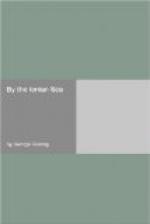There was a good view of Taranto across the water; the old town on its little island, compact of white houses, contrasting with the yellowish tints of the great new buildings which spread over the peninsula. With half-closed eyes, one could imagine the true Tarentum. Wavelets lapped upon the sand before me, their music the same as two thousand years ago. A goatherd came along, his flock straggling behind him; man and goats were as much of the old world as of the new. Far away, the boats of fishermen floated silently. I heard a rustle as an old fig tree hard by dropped its latest leaves. On the sea-bank of yellow crumbling earth lizards flashed about me in the sunshine. After a dull morning, the day had passed into golden serenity; a stillness as of eternal peace held earth and sky.
“Dearest of all to me is that nook of earth which yields not to Hymettus for its honey, nor for its olive to green Venafrum; where heaven grants a long springtime and warmth in winter, and in the sunny hollows Bacchus fosters a vintage noble as the Falernian——” The lines of Horace sang in my head; I thought, too, of the praise of Virgil, who, tradition has it, wrote his Eclogues hereabouts. Of course, the country has another aspect. in spring and early summer; I saw it at a sad moment; but, all allowance made for seasons, it is still with wonder that one recalls the rapture of the poets. A change beyond conception must have come upon these shores of the Ionian Sea. The scent of rosemary seemed to be wafted across the ages from a vanished world.
After all, who knows whether I have seen the Galaesus? Perhaps, as some hold, it is quite another river, flowing far to the west of Taranto into the open gulf. Gialtrezze may have become Galeso merely because of the desire in scholars to believe that it was the classic stream; in other parts of Italy names have been so imposed. But I shall not give ear to such discouraging argument. It is little likely that my search will ever be renewed, and for me the Galaesus —“dulce Galaesi flumen”—is the stream I found and tracked, whose waters I heard mingle with the Little Sea. The memory has no sense of disappointment. Those reeds which rustle about the hidden source seem to me fit shelter of a Naiad; I am glad I could not see the water bubbling in its spring, for there remains a mystery. Whilst I live, the Galaesus purls and glistens in the light of that golden afternoon, and there beyond, across the blue still depths, glimmers a vision of Tarentum.
Let Taranto try as it will to be modern and progressive, there is a retarding force which shows little sign of being overcome—the profound superstition of the people. A striking episode of street life reminded me how near akin were the southern Italians of to-day to their predecessors in what are called the dark ages; nay, to those more illustrious ancestors who were so ready to believe that an ox had uttered an oracle, or that a stone had shed blood. Somewhere




